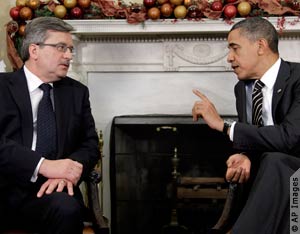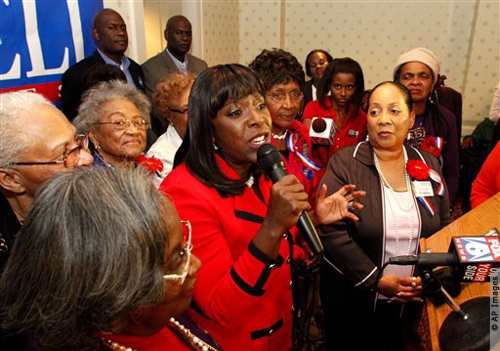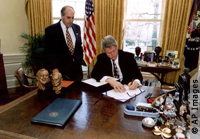President Obama and Polish President Bronislaw Komorowski reaffirmed their commitment to the U.S.-Polish alliance. Alassane Ouattara has legitimately been elected president of Côte d’Ivoire and needs to be respected, says Ambassador to the U.N. Susan Rice. The U.S. urges calm after controversial elections in Haiti. China has a critical role to play in reducing tensions on the Korean Peninsula. The U.S. is working with other nations to confront piracy off the coast of Somalia. Learn about the Iran Primer and the International Writing Program. And, finally, American soccer stars visit Cyprus.
 The U.S.-Polish Alliance
The U.S.-Polish Alliance
(mobile version)
President Obama and Polish President Bronislaw Komorowski meet in the Oval Office and reaffirm their commitment to expanding defense cooperation, supporting greater economic links and promoting democracy in Europe and globally. Additionally, they call for U.S. and Russian ratification of the New START arms reduction treaty, which Komorowski, left, says is “the investment in the better and safer future.”
The Vote in Côte d’Ivoire
(mobile version)
U.S. Ambassador to the U.N. Susan Rice says a communiqué from the Economic Community of West African States backs Côte d’Ivoire’s Independent Electoral Commission’s declaration that Alassane Ouattara is the country’s legitimately elected president. Ouattara “has been elected,” she says, and “he needs to be respected.”
U.S. Urges Calm After Haiti Vote
(mobile version)
The Obama administration calls for calm in Haiti as irregularities and complaints stemming from the country’s November 28 presidential election are reviewed. State Department spokesman Philip J. Crowley says the United States and others in the international community “stand ready to support efforts to thoroughly review irregularities so that the final electoral results are consistent with the will of the Haitian people.”
U.S., China to Meet on North Korea
(mobile version)
Deputy Secretary of State James Steinberg is leading a high-level team of officials to Beijing for talks with senior Chinese officials about Northeast Asian security and recent hostile acts by North Korea. “China has a critical role to play” in reducing tensions on the Korean Peninsula, says Steinberg.
Confronting Somali Pirates
(mobile version)
The United States is working with more than 60 nations and international organizations to confront piracy off the coast of Somalia, a problem that has threatened the development, peace, security and stability of eastern Africa.
The Iran Primer
(mobile version)
Journalist Robin Wright asked more than 50 experts from government, universities and think tanks, from the United States and the Middle East, to help her educate Americans about modern Iran. The resulting chapters became the Iran Primer.
When Writing Meets Dance
(mobile version)
An international group of writers had their words interpreted by the CityDance Ensemble of Washington as part of the International Writing Program (IWP) at the University of Iowa. “We represent a united nations of writers,” says Christopher Merrill, director of the IWP, “and we are always looking for connections among readers, writers, audiences, and translators.”
 American Soccer Stars in Cyprus
American Soccer Stars in Cyprus
(mobile)
Through the U.S. Department of State’s Sports Envoy program, former U.S. men’s national players Tony Sanneh and Sasha Victorine led soccer clinics for Greek Cypriot and Turkish Cypriot youths during a coaching trip to Cyprus. “Soccer is one of the universal languages that allow us to communicate with people from all over the world,” says Sanneh. At right, Victorine high-fives young players.



 U.S. Condemns “Outrageous” N. Korean Attack
U.S. Condemns “Outrageous” N. Korean Attack









 American Indian Heritage Month
American Indian Heritage Month